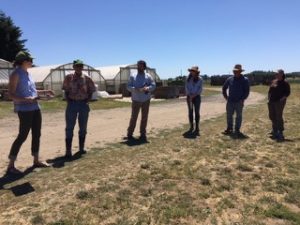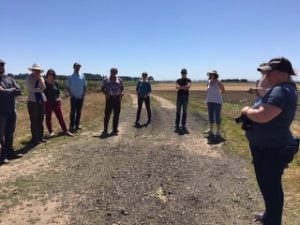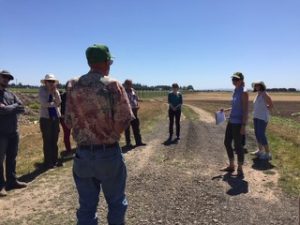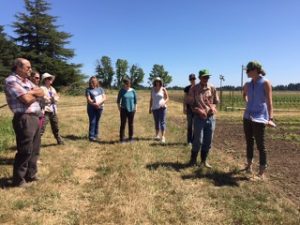Final report for EW16-015
Project Information
As the final rules for the Food Safety Modernization Act (FSMA) were being published, it had become apparent to organic certifying organizations that small organic producers were not prepared to implement food safety practices, that many of the “clean fields” practices that have been implemented by private industry are not compatible with organic requirements, and that neither Cooperative Extension nor the organic certifiers were prepared to advise farmers on the intersection between organic rules and food safety rules. For the past six years, the Community Alliance with Family Farmers (CAFF) has been operating a food safety outreach program in California for small family farms, including a number of organic farms, in collaboration with various Cooperative Extension (CE) specialists and farm advisors. CAFF has also partnered with Wild Farm Alliance (WFA) to produce several documents that discuss the intersection of food safety concerns with the management of domestic animals, wildlife and biodiversity on farms. Those circumstances led us to submit a proposal to WSARE and complete a project that included assembling food safety resources from across the country, synthesizing them and having them reviewed by food safety experts at UC Davis and Oregon State. We also created eight fact sheets and additional web site material. To share these new resources we held three webinars with the CCOF Foundation and three workshops for the staff and inspectors of all organic certifiers that operate in the Western SARE region, as well as for select Cooperative Extension farm advisors, especially the small farm advisors. The project was overseen by a committee of organic farmers composed of board members of CAFF and the CCOF Foundation. We completed all of our deliverables on time and received positive feedback from webinar and workshop attendees.
We have completed all of the objectives and sub-activities listed below.
Objective 1—Assemble materials on NOP rules and food safety metrics and points of conflict.
October 2016 - March 2017
- Find all relevant materials and research with assistance of university specialists (CAFF)
- Choose specific issues of friction between organics and food safety for focus of workshops and webinars, such as compost, manure, water quality, land use, animal intrusion, wildlife habitat, and integration of domestic animals into crop production (CAFF, WFA, CE)
- A pre-evaluation form will be sent to a number of potential participants in the training to understand some of the biggest challenges and questions they have with respect to food safety and also what types of questions or challenges they hear from small growers. This will be used to help prepare for the workshops and webinars in order to better align with what would be most beneficial to participants as well as understand the types of templates and resource material that are missing.
- Decide on content of publications and fact sheets (CAFF, WFA, NCAT)
Objective 2—Prepare webinars and workshop curricula
March 2017 – August 2017
- Develop webinars (CAFF and WFA)
- Develop workshops (CAFF, WFA)
- Write or revise publications and fact sheets (CAFF, WFA, NCAT)
- Conduct review of all materials with university specialists
Objective 3—Hold workshops and webinars in California and Oregon on organics and food safety, training organic certification staff and contractors, as well as Cooperative Extension and other interested professionals.
September 2017 – February 2018
- Hold 3 webinars (CCOF) and 3 workshops (CCOF—2, Oregon Tilth—1)
- Evaluate the understanding and applicability of the material as we proceed
Objective 4—Further disseminate information by posting webinar on various web sites, distributing materials to interested organizations across the country, updating NOP tip sheets.
March 2018 - August 2018
- NCAT will seek to update the NOP tip sheets on issues related to food safety (such as use of compost and manures, and they will also post the materials on their web site and train their employees who answer the toll free ATTRA phone line.
- Post webinar(s), publications, and fact sheets on CAFF, CCOF, WFA, NCAT, Oregon Tilth, and Extension web sites.
Cooperators
- (Educator)
- (Educator)
- (Educator and Researcher)
Education & Outreach Initiatives
Hold webinars in California and Oregon on organics and food safety, training organic certification staff and contractors, as well as Cooperative Extension and other interested professionals.
The webinars were recorded and posted on CAFF and CCOF Foundations websites. Anyone can freely view these resources. Below are the various hyperlinks to the CAFF and CCOF Foundation locations of the webinars.
CAFF webinar homepage: https://www.caff.org/webinars/
CAFF webinar one hyperlink: https://www.youtube.com/watch?v=AWKf-yKMlkA
CAFF webinar two hyperlink: https://www.youtube.com/watch?v=IBUvsIyTUfY&feature=youtu.be
CAFF webinar three hyperlink: https://www.youtube.com/watch?v=iXUTM9nTgI8&feature=youtu.be
CCOF Foundation webinar homepage: https://www.ccof.org/ccof-foundation/organic-training-institute/past-events-recordings
CCOF webinar 1: https://www.ccof.org/sites/default/files/FSMA_101_Webinar_for_Organic_Professionals_2017.mp4
CCOF webinar 2: https://www.ccof.org/sites/default/files/RequirementsForFarmsThatMustFullyComplyWithFSMA_2017.mp4
CCOF webinar 3: https://www.ccof.org/sites/default/files/FoodSafetyAndOrganicWebinar_2018.mp4
In our proposal we had three main learning outcomes and associated impacts of those outcomes. Both are explained below.
1: A significant cohort of organic professionals will be educated, trained and understand—including organic certification agents of CCOF, Oregon Tilth, and other certifying organizations in the West—about food safety metrics and FSMA regulations, and how they line up with the NOP regulations the organic certifiers are trying to enforce. We believe that this will help them to interact with farmers who are confused about the two sets of rules or who have heard conflicting requirements from food safety auditors.
2: A second outcome is that Cooperative Extension advisors will learn the same information, which very few of them understand. They will be called upon to advise farmers on food safety in the coming years and it will be important for them to understand the organic/food safety interface because of the large amount of organic produce production in the West.
3: A third outcome is that small organic farmers will be indirectly assisted as these two groups we seek to train share and disseminate the information they learned and resources they gained.
Hold workshops in California and Oregon on organics and food safety, training organic certification staff and contractors, as well as Cooperative Extension and other interested professionals.
Workshop sign in sheets are linked below.
We collaborated with Oregon State University and Oregon Tilth to provide an on-farm food safety training in the summer of 2017. We had a good turn out of 23 people from the following groups: organic inspectors, certifiers, Oregon extension folks, and a couple farmers. The first part of the training was held inside and consisted of more formal presentation on the regulations. Then we moved to the farm and spent an hour learning from an organic farmer who had developed a food safety program on his farm as well. Over the course of the half day 38 questions were answered. Below are a few photos from the event.




We also conducted two trainings in California in collaboration with the CCOF Foundation. The first training was held on 10/24/17 and included 13 inspectors who asked 32 questions over the course of the presentation. The second training occurred on 11/1/17 and included 40 participants who asked 12 questions. The sign in sheets for both trainings are below.
In our proposal we had three main learning outcomes and associated impacts of those outcomes. Both are explained below.
1: A significant cohort of organic professionals will be educated, trained and understand—including organic certification agents of CCOF, Oregon Tilth, and other certifying organizations in the West—about food safety metrics and FSMA regulations, and how they line up with the NOP regulations the organic certifiers are trying to enforce. We believe that this will help them to interact with farmers who are confused about the two sets of rules or who have heard conflicting requirements from food safety auditors.
2: A second outcome is that Cooperative Extension advisors will learn the same information, which very few of them understand. They will be called upon to advise farmers on food safety in the coming years and it will be important for them to understand the organic/food safety interface because of the large amount of organic produce production in the West.
3: A third outcome is that small organic farmers will be indirectly assisted as these two groups we seek to train share and disseminate the information they learned and resources they gained.
Educational & Outreach Activities
Participation Summary:
Learning Outcomes
Project Outcomes
Impacts
We provided three main outcomes in our proposal and we succeeded at accomplishing all of our deliverables to our target audience of organic professionals, Cooperative Extension advisors, and small organic farmers (indirectly). The factsheets and webinars are posted on our website and our project collaborators (CCOF, Oregon Tilth, NCAT, and WFA) are all aware of the resources and have shared them with their networks of organic professionals.
Farm Food Safety Plans Factsheet
Wild and Domestic Animals Factsheet
Worker Health and Hygiene Factsheet
Accomplishments
We created and published eight factsheets (see below), provided three in-person trainings to 77 people, and three webinars to 177 people live. The webinar recordings have been viewed a total of 105 times as of 4/18/18.
The medium-sized farm where we held our Oregon training has been working on making food safety changes to reduce their risks for a number of years. The main farmer, David, showed the group various on-farm examples for how they have improved their food safety program over the years while still maintaining compliance with the NOP regulations. David mentioned after the training that he really appreciated being able to help organic professionals learn about how farms can come into compliance with both regulations while still maintaining a profitable business. He thought it was great for that "in-the-field" exposure for folks that may not know a lot about how farmers actually get into compliance with both FSMA and NOP.
In the workshop evaluations we received some responses from attendees on topics that they'd like to learn more about. Some of the suggestions that would require future research include: a guide with lots of photos on the best pack house designs for small farms so that they are aligned with the Food Safety Modernization Act (FSMA) and only use allowable products under the National Organic Program; clarity on the rules for application of raw manure (which has not been finalized yet by FDA, so once it's finalized there will be a need to do more outreach and education to folks about the final rule details); and a more detailed explanation of water treatment options that meet both FSMA and NOP requirements.